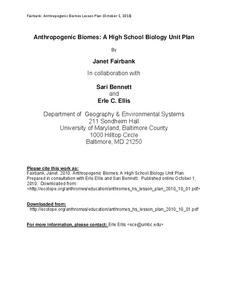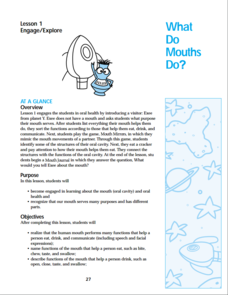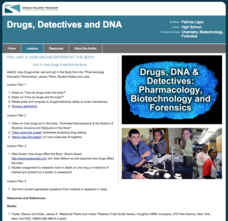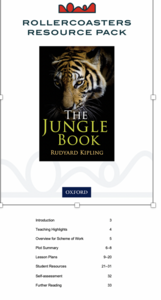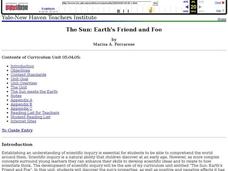Cal Recycle
Conserving Natural Resources
Trying to plan an engaging elementary science unit on natural resources? Conserve your energy! This five-part series of lessons and hands-on activities has exactly what you need to teach young scholars about the importance of conservation.
Core Knowledge Foundation
Cycles in Nature Tell It Again!™ Read-Aloud Anthology
A read-aloud anthology offers stories all about nature's life cycles. Over three weeks, second graders listen to and discuss tales about the cycles of daytime, nighttime, seasons, plants, trees, frogs, butterflies, and water. Following...
NASA
Food For Thought
Science can be quite tasty. A delectable unit from NASA shows learners why it's important to consider food, nutrition, and health in space. Four lessons explore the idea in great depth, including testing cookie recipes. Along the way,...
Core Knowledge Foundation
Weather or Not, Seasons Change
Embark on a year long investigation of the seasons with this 10-lesson earth science unit. After being introduced to different types of weather and the tools used to measure it, young scientists perform fun hands-on activities that...
Core Knowledge Foundation
A Time for All Seasons - Spring
Celebrate the arrival of spring with this fun primary grade science unit. Engaging young scientists with a variety of hands-on activities and inquiry-based investigations, these lessons are a great way to teach children about...
Brooklyn Children’s Museum
Volcanoes!
Give young geologists an up close and personal look at volcanoes with a series of hands-on earth science lessons. Whether they are investigating the properties of igneous rocks, building their own volcanoes, or making...
Lerner Publishing
Teaching Habitats
What makes up a habitat? Use this resource to engage first graders in the exploration of desert, wetland, forest, and ocean habitats. Youngsters classify plants and animals into the four distinct habitats through drawings and cutting and...
Curated OER
Anthropogenic Biomes
If you teach a man to fish, he will never go hungry—or he will overfish and permanently damage the ecosystem? Address the traditional biomes as well as the human-included ecosystems and contrasts the biotic and abiotic factors in each....
National Institutes of Health
Open Wide and Trek Inside
Don't underestimate the value of a clean mouth! Here is a six-lesson unit that details everything a youngster needs to know about oral hygiene. It includes lessons on the purpose of a mouth and teeth, the nature of oral...
Lerner Publishing
Meet the Dinosaurs
Take your class of youngsters on a prehistoric adventure with this four-lesson series on dinosaurs. Accompanying the Meet the Dinosaurs books by Don Lessem, these lessons engage children in writing their own dinosaur books,...
Kenan Fellows
Unit 3: How Drugs Enter/Exit the Body
The third of a four-part series on Pharmacology teaches scholars how drugs enter and exit the body, how they act inside the body, how they affect the brain, and more. Over the course of the unit, groups complete two labs and one...
Oxford University Press
The Jungle Book
Most every teacher dreams of a ready-to-teach and print book study. Well, here it is! The Jungle Book novel resource includes 12 complete lessons studying poetry, author's craft, themes, characters, and more. Scholars role play,...
Lerner Publishing
Living or Nonliving
It's alive! Or is it? Through a series of shared readings, whole class activities, and independent exercises children explore the difference between living and non-living things, creating a pair of printable books...
University of Southern California
What Is The Ocean?
Go on a tour of the ocean through the lens of a scientist. Learners read maps of the ocean floor, study tide behavior, examine wave motion, and analyze components of soil. Each lesson incorporates a hands-on component.
Next Generation Science Storylines
Why Don't Antibiotics Work Like They Used To?
Bacteria get more resistant to antibiotics every year. Learn the reason for this pattern and how scientists are addressing the problem in a six-week unit. Learners analyze different types of bacteria and their adaptations.
Curated OER
The Sun: Earth's Friend and Foe
Students study the structure and features of the sun. In this earth science lesson, students explain how the sun's energy drive the processes on Earth. They perform temperature conversions using appropriate equations.
Purdue University
What a Waste of Food!
Follow the life of an apple from harvest to the consumer. A three-part lesson describes the different steps to get an apple from the farmer to your kitchen and the approximate waste that happens at each step. They discuss the process and...
NASA
Transportation and Space: Reuse and Recycle
What can I use in space? The three-lesson unit has groups research what man-made or natural resources would be available during space exploration or habitation. Team members think of ways that resources can be reclaimed or reused in...
NASA
Space-Based Astronomy on the Internet
Young scientists compile everything they have learned into a report in the fifth and final lesson in a unit on the visible light spectrum. Access to photos from observatories, telescopes, and satellites allows learners to compare...
Intel
Biomes in Action
A STEM project-based learning lesson, number four in a series of 10, focuses on human impacts to biomes around the world. Groups work together as environmentalists to research a specific biome, investigating human impacts on it. From...
Brain Targeted Teaching
Tuck Everlasting Novel Study
The broad ideas included here provide clear ideas on how to use brain-targeted learning, what activities work best with Tuck Everlasting, how to apply the knowledge gained from their reading, and ideas for evaluation. Not teaching...
Out-of-School Time Resource Center
Nutrition and Physical Activity
Emerging nutritionists explore what it means to be healthy. In the beginning of the unit, your class will examine the five food groups and learn how food gets from the farm to our plates. This leads into the investigation of...
Curated OER
Improving Discussion Lessons
Students participate in group activities to stimulate group discussions. They respond to statements by listening, reacting, reading, and modifying them. They discuss the statements of their group and listen to those created by the other...
Education Development Center
Language of Algebra
Don't rush into algebra, let learners visualize, guess, and predict their way to a successful math career. The introductory unit incorporates beginner algebraic concepts with shapes instead of variables. Young mathematicians use a...







